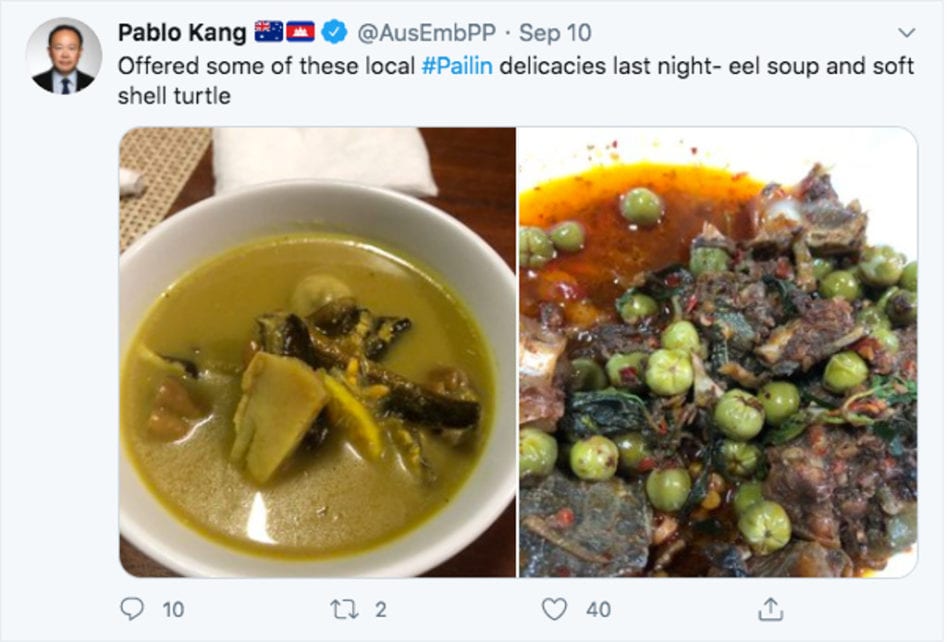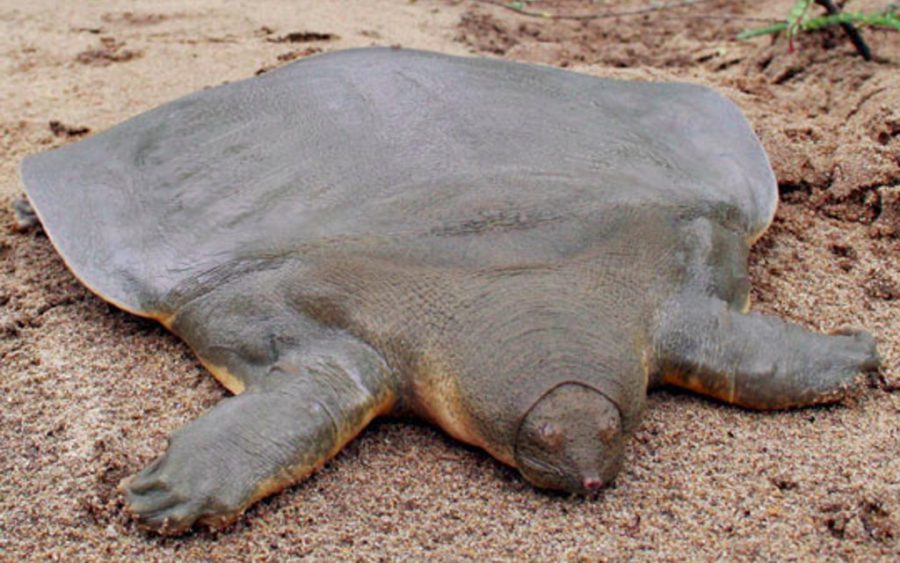After deleting a tweet showing a dish containing soft-shell turtle, some species of which are endangered, the Australian Embassy said Tuesday that Ambassador Pablo Kang had tasted the food during a provincial trip last week and “was assured it was farmed.”
In a September 10 post on Twitter, Kang shared two foodie photos, writing “Offered some of these local #Pailin delicacies last night- eel soup and soft shell turtle.” The tweet garnered at least 40 likes and 10 responses — some critical and noting that the Asian giant soft-shell turtle is endangered — before it was deleted by the user on Tuesday.
Kang traveled to Pailin, Battambang, Banteay Meanchey and Siem Reap provinces from September 7 to 11, visiting sites where Australian development aid has supported Covid-19 safety measures and demining efforts, the Australian Embassy said in an email.
“During his visit, Ambassador Kang was offered a dish containing soft shell turtle during an official meal. Ambassador Kang tried the dish out of courtesy to his host. He was assured it was farmed,” the embassy said, adding that Kang had deleted the tweet featuring the meal.
“Ambassador Kang does not condone eating wild soft shell turtle,” the embassy added.

Chann Sopheap, chief of the Fisheries Administration’s endangered species office, said only one soft-shell turtle species, the Chinese soft-shell, could be legally bred and sold for food in Cambodia, with a government-issued license.
The nation’s “scarce” population of Asian giant soft-shell turtles, also known as Cantor’s soft-shell turtles, were not allowed to be farmed or sold, Sopheap said.
“Normally, the people who eat that, it’s illegal,” he said. “Now it’s endangered, so it’s difficult to [even] find for eating.”
People caught selling the frog-faced Asian giant soft-shells to restaurants could be fined three times the black market price for a first offense, six times the price for a second offense, and may be arrested and sent to court for a third offense, Sopheap said. He was unsure of the current market price for the endangered reptiles.
The International Union for Conservation of Nature and Natural Resources’ red list last assessed the Asian giant soft-shell turtle as endangered in 2000, according to the group’s website.
In May, conservation organization WCS marked World Turtle Day by noting an increase in the number of the species’ nests and eggs in Cambodia, with more than 800 baby turtles hatched and over 650 released into the wild.
Scientists did not observe the turtles in the wild in Cambodia between 2003 and 2007, until the species was found on the Mekong River between Kratie and Stung Treng provinces, WCS said in a statement.
On Twitter on Tuesday, Kang said he removed the tweet and apologized to those who took offense.
“My intent was not to promote these dishes, but to tell people about some of the foods I was offered during my recent provincial visit,” he said.
“I certainly do not condone the harvesting of any endangered species for food or other purposes, and will be more careful about my actions in future.”
Environmental activist Alejandro Gonzalez-Davidson said the Australian ambassador’s original tweet was a missed opportunity to raise awareness about an endangered species, and Australia should put funding toward soft-shell turtle conservation efforts.
“[F]or showing rather appalling knowledge about the realities of Cambodia’s immensely under threat wildlife, the ambassador not just needs to apologize to the Cambodian people, but also needs to ensure that some funding from his embassy is directed towards the conservation of this magnificent species.”
Updated at 10:02 p.m. to include a comment from Australian Ambassador Pablo Kang.












